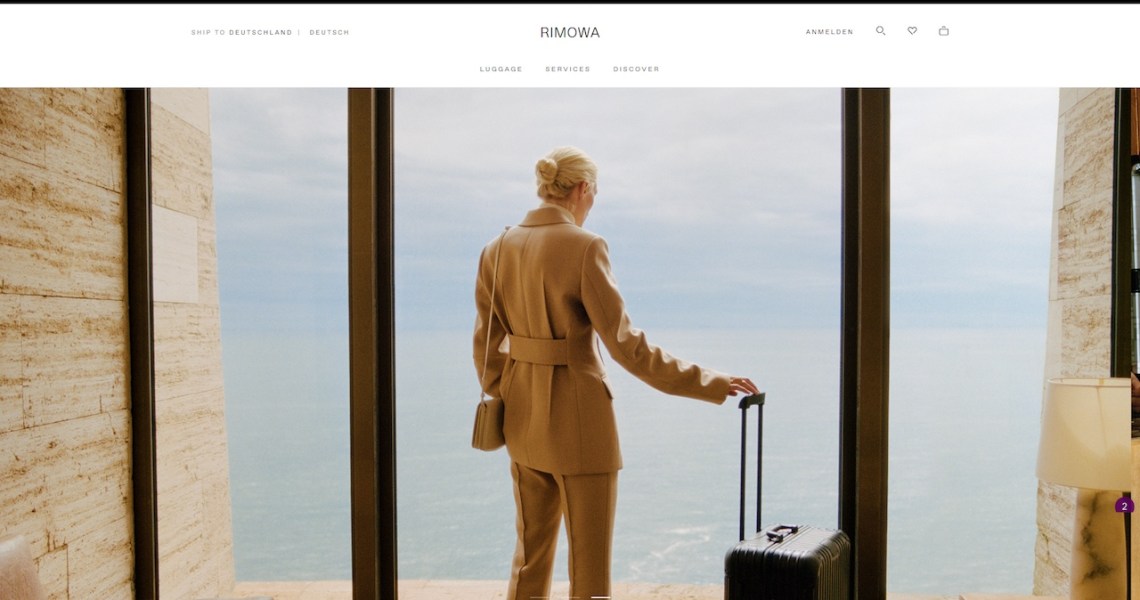Glossy+ members stay ahead of the rapidly evolving fashion and beauty industries with access to exclusive content, reports, and guides. In the Glossy guide to Tmall, we examine the platform’s dominance on the world retail stage — from what brands have learned from selling there, to what’s fueling the site’s beauty boom and how it made $30.8 billion in one day. To read the full report, click here to become a Glossy+ member.
In China, LVMH-owned Rimowa is selling exclusively on Tmall.
The German luxury luggage manufacturer launched its Tmall store in October 2018. “The purchase pathway of Chinese luxury consumers is highly digitalized,” said CEO Alexandre Arnault of the brand’s decision to enter the Chinese market. “On average, 60% of the four to five touch points before final purchase are online. We recognize our customer’s need to have access to Rimowa on their terms and on the platforms most relevant to their daily use.”
Considering demand for Rimowa products in the region was already high — counterfeits of its signature hard-shell aluminum suitcases in China are aplenty — and the brand had seen success on WeChat promoting its collaboration with Fendi, making a major investment in selling in China seemed like an obvious next step toward growth. China has also been the brand’s fastest growing market over the past few years.
Rimowa gravitated toward Tmall versus competitors based on its “ability to reach consumers from in over 120 cities across China.” Arnault cited the stat that “over 50% of Chinese luxury consumers live beyond China’s top 15 cities” as a motivator to best connect with new and existing customers in a part of the world in which the brand had not previously heavily invested. “The appetite for novelty in China is massive,” he said. “The greatest challenge is keeping up with the demand for new products. Taking this into consideration, we have been adapting to meet these high expectations.”
Since opening its store on Tmall, Rimowa has seen the number of customers between the ages of 18 and 25 triple through initiatives like the launch of its new seasonal collection of Essential colors and the debut of the Rimowa x Off White collaboration campaign via Hey Box, which received the “Cross-Over Innovation of the Year Award” at Tmall’s Chinese Consumption trend ceremony. Most recently, Rimowa named Chinese actor, singer and dancer Jackson Yee as its new Chinese brand ambassador, which Arnault said “built awareness, created interest through social content engagement and piqued customers’ interest in the collection.” The reason these actions have been so successful, he said, is because of Tmall and its notoriously strong marketing campaigns. He cited Super Brand Day, “a marketing tool that rallies all resources across Alibaba’s ecosystem for a single brand, converting sales in a shorter cycle,” as a way Rimowa was able to ‘increase reach on the platform [and] provide a better and more seamless customer experience.”
Rimowa’s primary focus on the platform aligns with Tmall’s mission: Rimowa wants to “optimize the customer’s journey,” said Arnault, and that comes through increasing efficiency and conversion, launching new products, and showcasing “creative content that is reflective of Rimowa’s brand ethos geared at the purposeful traveler.” What’s more, the customer it’s catering to is already seeking out its product. (Interest in luxury luggage grew to $62.5 billion in 2017). The brand’s success on Tmall adds up.
Ad position: web_incontent_pos1




